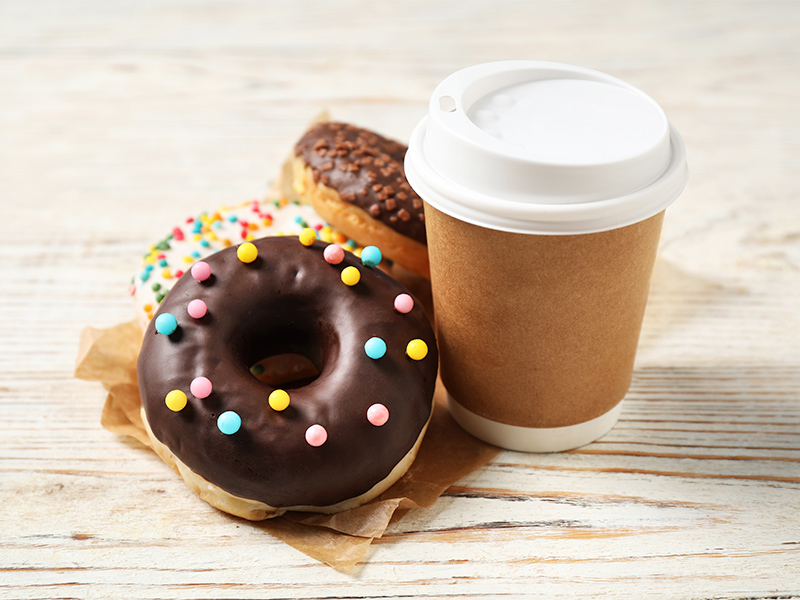Feeling anxious? These common foods (and drinks) could be to blame
Choosing a tuna salad over a burger could make all the difference to how you feel later. Here’s why, plus the worst anxiety-inducing foods to avoid.
If you’ve ever felt jittery after a couple of espressos, or depressed after a weekend of junk food, you’ll understand we truly are what we eat.
Now, more than ever, researchers are looking into the role diet plays in our mental health, with a keen focus on the gut-brain axis – essentially, biochemical signalling that takes place between the gastrointestinal system and the brain.
How diet impacts mental health
One review, for example, suggests gut microbiota – the microorganisms that live within our digestive tracts – regulates brain function via the gut-brain axis, while another study found the same microbiota plays a vital role in regulating neurotransmitters.
”These chemicals convey messages from the gut, through the nervous system to the brain, impacting our mood and anxiety levels,” The Fast 800 nutritionist Gabrielle Newman says.
“Eighty per cent of our serotonin – the happy hormone – is produced in the gut.”
Nutritionist and naturopath Madeline Calfas says maintaining good gut health is essential for our wellbeing.
“Probiotic and fermented foods such as sauerkraut, kimchi and kefir have been shown to help balance the microbiome in the gastrointestinal tract, resulting in less dysfunction and better absorption of nutrients,” Madeline says.
“They can also help to calm inflammation caused by an imbalance of the microbiome – a move that leads to a reduction in adrenaline and cortisol.”
Our experts say eating a diet rich in Omega-3 fatty acids (found in oily fish such as salmon and tuna), high in fibre, and varied in colourful fruits and vegetables can assist, but you should also look to avoid anxiety-inducing foods.
Common anxiety-inducing foods to avoid:
Fast food
Having the odd burger or basket of fries might be convenient, but these foods are high in sodium, refined sugars and saturated fats, Madeline says.
“Not only do each of these carry their own contribution to anxiety, but these foods are difficult for your body to digest, which places strain on your digestive system, further triggering adrenaline-release in your body,” she explains.
Similarly, she suggests you avoid placing highly processed foods such as sausages, pies and salami in the supermarket trolley.
Alcohol
A sneaky glass of red here and there is fine, but if it’s becoming a regular habit, it’s time to stop and reassess, Gabrielle says.
“Alcohol can disrupt the chemicals and processes in your brain, affecting thoughts, feelings and actions,” she explains.
“It can also increase inflammation in the body and upset the gut microbiome.”
- Post-booze panic: Got a case of hangxiety after a big night? Here’s what to do
Refined sugar
Convinced that ice-cream or a chocolate bar makes you feel good?
It does, in a way – by rapidly increasing your blood sugar levels for a short period.
But then just as rapidly, it plummets them, so you end up feeling lethargic and irritable.
“Doing this on a regular basis means that your body starts to release adrenaline and cortisol into your bloodstream as it tries to combat this up-and-down action of your blood sugar levels – these adrenal hormones can then increase anxiety levels,” Madeline explains.
Caffeine
Gabrielle says while caffeine can boost energy levels and focus short-term, it can also increase feelings of anxiety and nervousness.
Essentially, it activates the adenosine receptors in both your central and peripheral nervous systems, known commonly as your “fight or flight” response, she explains.
“You may want to limit your intake of coffee, tea and other caffeinated beverages if you’re prone to these feelings.”
Some smoothies
While smoothies can be an excellent way to pack a variety of fruits and leafy vegetables into one tall glass, our experts say it’s best to limit large, store-bought, fruit-only smoothies or fruit juices.
These drinks have a higher glycemic load and can produce a spike and fall of blood sugar levels – exactly as you would experience with refined sugars.
If you’re struggling with feelings of anxiety, contact your GP for further advice.
Written by Dilvin Yasa.





